Federated Colonies of Australia – A Failed State
'Australia is not a nation formed under the customary international law. The Aboriginal Nations, however, were formed properly under that ancient system. Australia is an administratively formed country by the United Nations, designed to give Britain more votes in the General Assembly. In the light of Australia’s non-conformance with UN Human Rights Treaties and Conventions, it is reasonable to hold that this administrative creation of the Nation of Australia is a failure, and Australia is a true failed state.’
For all our non-Aboriginal and First Nations sceptics, the conflict of superior laws is indeed a very real issue, because, as Mabo pointed out, if the country was not truly terra nullius there were only two other ways in which the colonisers could acquire our lands legitimately: by conquest or cession, neither of which happened. Any other way is a true invasion.
The rules of the conflict of laws provide that foreign statutes have no effect in overseas jurisdictions. There can be no British Charter 'accepting’ English law in Australia. An ancient Law has operated in Australia, and still operates, and has stood the test of time, for millennia, from long before the existence of the British people who colonised our Sovereign Nations.
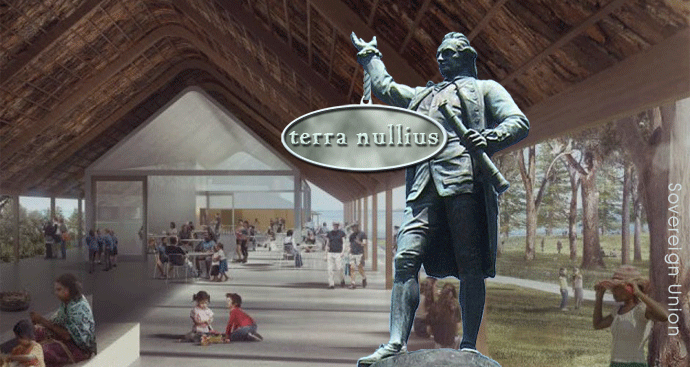
If the continent was not truly terra nullius there were only two other ways in which the colonisers could acquire our lands legitimately: by conquest or cession, neither of which happened. Any other way is a true invasion. - Image: La Perouse Aboriginal Land Council have virtually agreed to celebrate the invasion by agreeing to the overall project to redevelop the Kurnell site, with $50 million in federal and NSW state funding. Article.

Ghillar, Michael Anderson 8 May 2018
We need to question what is the intent behind the Commonwealth government's obsessive and desperate need to increase the façade of colonial legitimacy. The Commonwealth government's latest effort is the funding of an expensive memorial at Botany Bay to Captain Cook:
ABC News, 29 April 2018
To answer this we need to address the very important subject of colonisation and decolonisation, because governments in Australia are now moving swiftly to circumvent the rise and influence of the First Nations' Sovereignty Movement.
Governments know that we have come to a point in our history where the slogans 'We have survived', 'Always was and always will be Aboriginal Land', 'Sovereignty Never Ceded' and 'Pay the Rent' are no longer just slogans and chants in demonstrations. The critical time in our historical fightback was from the first day Cook approached our shores and spears were thrown at him. When we talk about critical moments in history this was Day One of our resistance to the British invaders.
Despite the genocidal operations of the British and Australian colonialists, we have survived to continue to throw the spears of resistance, only our resistance is much more sophisticated than pointing a gun. In the words of Martin Luther King 'Unarmed truth is the most powerful force in the universe'.
There is another story of truth sitting behind Federal Treasurer, Scott Morrison's announcement that:
… a new $3m memorial to Captain Cook will be built at Sydney's Botany Bay, as part of a “very inclusive project” to commemorate the site of European colonisers' first arrival on Australian soil.
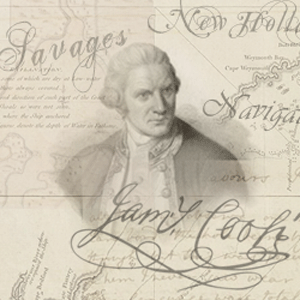
The Continental Whitewash
by Graeme Taylor
In Dare to Be Wise we drew attention to the contradiction between Cook's version of raising the flag on Possession Island in the Torres Strait and the version by the highly observant botanist, Joseph Banks who completely omitted any reference to raising a flag on Possession Island. In fact, it was a sovereign person from that area who first alerted us to the fact that his People have a Story that Cook did not raise a flag on Possession Island. Such is the power of oral culture.
In his recent article Stirring the Pot of the Dead Cook, Graeme Taylor has delved deeper into this contradiction between the Cook's and Banks's journal entries and concludes:
The only explanation that seems plausible is that the whole 'Possession Island thing' was made up afterwards, most probably after Cook's death in 1779. That the British Crown claimed, eight years after Cook's death, in 1787, the whole Eastern Half of New Holland as Crown Land, with the British Crown the sole owner, is perhaps the biggest Crime of all time. Even if Cook's diary entry is true, Cook only claimed a coast, not the lands itself. The claim over half the continent was made in 1787 back in England:
To understand the political and legal dynamics operating in Australian society, next we need to ask: So then, what is colonialism?
Colonialism is defined in several ways:
'The policy or practice of acquiring full or partial political control over another country, occupying it with settlers, and exploiting it economically'.
A colony is 'a union of citizens or subjects who have left their country to people another, and remain subject to the mother country.3 W. C. C. R. 287.. The country occupied by the colonists is also called a colony. A colony differs from a possession, or a dependency.'
'Colonialism is a relationship between an indigenous (or forcibly imported) majority and a minority of foreign invaders. The fundamental decisions affecting the lives of the colonized people are made and implemented by the colonial rulers in pursuit of interests that are often defined in a distant metropolis. Rejecting cultural compromises with the colonized population, the colonizers are convinced of their own superiority and their ordained mandate to rule.
trans. Shelley Frisch. Markus Weiner Publishers. p. 16. ISBN 978-1-55876-340-1
Collins English Dictionary (2011) defines colonialism as 'the policy and practice of a power in extending control over weaker peoples or areas'.
Webster's Encyclopedic Dictionary (1989) defines colonialism as "the system or policy of a nation seeking to extend or retain its authority over other people or territories."
Now let us turn our attention to the impacts of colonialism
The French ethnologist and anthropologist, Pierre Clastres (1934–1977), wrote of his experiences in South America, where he described wholesale massacres and killings, and genocide on a massive scale. Pierre Clastres' work could have been describing Australia and our First Nations' experiences of the British.
When Clastres speaks about 'the survivors' he is very observant, describing how these occupying powers establish new regimes to absorb First Nations populations into the colonial society.
This he describes as when the colonialists determine who is 'good' and who is 'bad'. The good ones are offered civil rights, citizen rights, because they are more willing to become Christianised and Westernised, resulting in their full assimilation into the colonial society, while those who choose to maintain their connection to Country and culture under their Law and customs are marginalized, resulting in them being criminalised through 'otherness'.
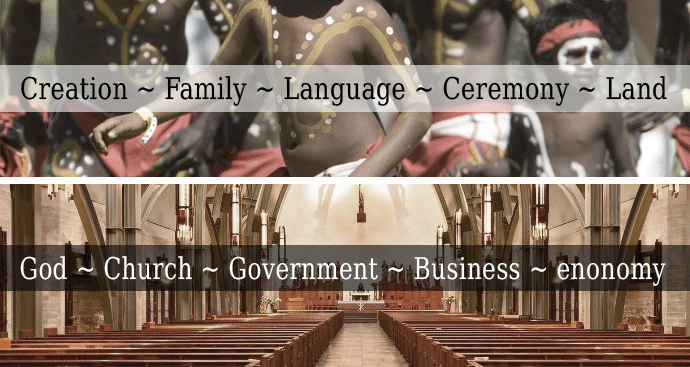
Sociologists who have studied Clastres' definitive works in South America are better equipped now to understand what Australian colonial authorities are doing. CD Rowley wrote in a style where he beggared belief about what was going on in Australia and its resultant effects on Aboriginal Peoples. His most shocking revelation was to admit in The Destruction of Aboriginal Society, 1970, that there was a trio of sinister operations that combined to continue the destructive assault upon the Aboriginal Peoples, who maintained their connection to Country, ceremony, Law and customary practices. These three operations–God (the Church), government and business (the economy)–combined to demonise First Nations' customary practices and those who continue to maintain their physical connection to Country.
First Nations's resistance to this day continues to challenge the power of these operations. First Nations are now confronted with the challenges of forging their own solutions through the assertion of their sovereignty.
Decolonising the mind
One of the first challenges is for our people to decolonise their minds, to release themselves from the insidious assimilationist mindset that generations have been exposed to.
Many First Nations people who have been educated into a colonised mindset and into the Western system now believe they understand the need for change in respect of their own People and promote the beneficial aspects of a commercially-based society. Many no longer see the need to maintain customary practices and protect Country. Their idea of protecting Country is to identify our sacred and significant sites, burial grounds and ancient campsites as being a continuation of customary practices, without ever being taught to understand the true significance and intricacies associated with the sacred Law and teachings, which stem from our Creation and which govern family, language, ceremony and land, our way.
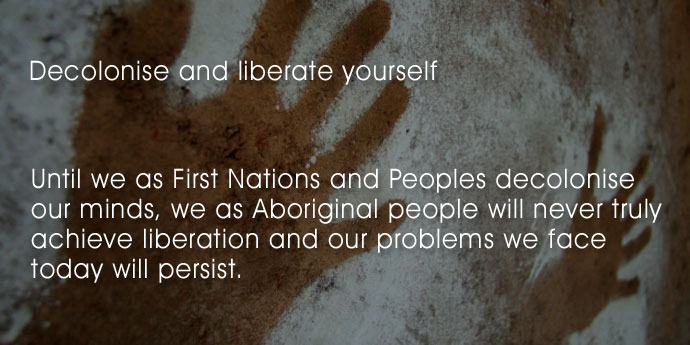
Until our thinking changes we will continue to identify with European culture and undermind and doubt our own culture, the oldest culture on earth.
Many of our people, only educated in the Western system, who have been cruelly dispossessed and have not had the opportunity to experience the profound depths of our culture, have sided with the assimilationist point of view, because of the promise of wealth, status and influence. Many of our people, educated only in the Western system, believe in their hearts and minds that there is no other way for our Peoples to go forward. The problem is complicated with more of our people being used as exhibits, as song-and-dance-routines and museum pieces, without the spiritual component that demands connection to Country at sacred sites. In my opinion, many of our people consciously need to decolonise their mindset and think in terms of the continuity of our ancient culture first. With an open mind, our culture has a way of reclaiming lost souls. Read more on decolonisation at:
See:
![]() Time for First Nations and Peoples to pick up the pace for 'Decolonisation'
Time for First Nations and Peoples to pick up the pace for 'Decolonisation'
![]() What is 'Decolonisation'? - How do we Decolonise?
What is 'Decolonisation'? - How do we Decolonise?
The most destructive of those practising perceived 'good intentions', however, are the Land Councils and the Native Title Service organisations. These organisations inevitably end up being enemies of First Nations. They are paid public officials who are accountable, not to the First Nations Peoples, but to government. Their job is to roll out a pseudo-beneficial right; to give recognition to traditional ownership of Country; and effect former PM John Howard's 'bucket loads of extinguishment' of Native Title without compensation of any kind.
Tragically, their role is to cause First Nations Peoples to surrender all claims past, present and future against the colonisers. Their job is to legitimise the theft of this continent and all its natural wealth, through the authorising of past acts, which include authorising 'future acts' to be classified as 'past acts'.
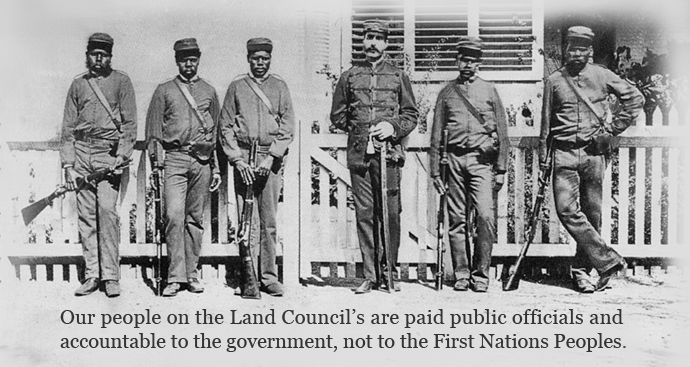
Native Title lawyers, who are paid by government, know that these acts are not in the best interests of their clients, yet pursue them with great vigour with their snout in the trough. They become agents of the colonisers and often their targeted personal objective is to become so-called 'experts' in their field of operation, ultimately leading to professorial positions in universities around the world. They do this without telling claimants the truth of how they implement the true guts of the scourge of colonialism, which is having devastating impacts upon First Nations Peoples.
Essentially their acts are the guillotine that severs our relationship to our own culture, customary practices, ancient spirituality and our Law.
These actions are acts of a society ruled by the colonial mindset. This is the colonists' Final Solution for unfinished business, and they win the support of the public by demonising First Nations Peoples, suggesting that they know better and are superior. What they do not tell the public is how they play politics with poverty.
It should be a compulsory requirement that a report is tabled to the parliament annually of whether or not there are short-term and long-term beneficial outcomes for First Nations Peoples and their communities from mining on their Country. It should be placed on the public record whether these communities can advance their own societies through self-determination using their own royalties from the desecrating mining operations on their Country.
This report card is a must, because hundreds of millions of dollars are being siphoned off by non-Aboriginal minders and administrators, whose job it is to administer these Trusts for and on behalf of the claimant families, who are supposed to be the beneficiaries of royalties and trust monies. Yet still the majority of claimant family members are on the Basic Card or White Card, having to live off welfare and government handouts, while their trust accounts from royalty monies are being eaten away by administration costs, bank fees and by non-Aboriginal people who are paid in excess of $100,000 per year, plus costs, to administer these funds. For example, the Gelganyem and Kilkayi Trusts, which administer royalties from the Argyle Diamond Mine in the East Kimberley, recently spent $1.2 million in one year on administration.
In some cases, Aboriginal communities are not permitted to access royalties for up to 20 to 25 years from the date of a mining agreement. This type of control over royalties prevents our people from being active in a free commercial world.
This is a government orchestrated strategy:Let the old resisters die off and the colonial power will take their children and educate them white way through the continued policy of de-Aboriginalising and 'criminalising otherness', so that the resisters are incarcerated, or worse are murdered by State sanctioned killings, aka 'Deaths in Custody'.
What we are currently experiencing in Australia is truly the bile of colonial operators. Colonialism is judged a success when they wipe out the native population, who have been the target for destruction from the very beginning, once the colonialists occupy the lands.
This is total genocide
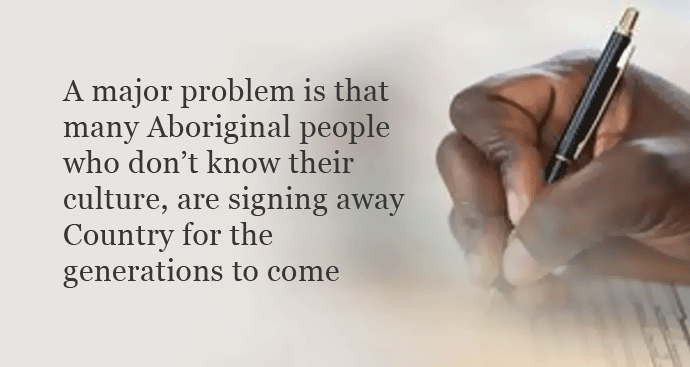
Some of our mob, whose sons and daughters have been brought up with strong cultural connections and are also educated and qualified within the colonial system and use this knowledge to fight for their Peoples' rights, seem to be fighting losing battles. This is because the government provides money for services to appease the First Nations Peoples, by supplying long-overdue essential services to win favour.
Such is the devastation caused by poverty.
Our Peoples know what they want and need, but the freedom fighters and rights activists have insufficient financial resources to provide these essential needs and so money and services become the bargaining chips and pacifiers, which are used as tools of coercion by the 'two bob mob'.
At times, it is refreshing to reread the full version of the Declaration on the Granting of Independence to Colonial Countries and Peoples Adopted by General Assembly resolution 1514 (XV)
of 14 December 1960:

The Declaration on the
Granting of Independence to Colonial Countries and Peoples
The General Assembly,
Mindful of the determination proclaimed by the peoples of the world in the Charter of the United Nations to reaffirm faith in fundamental human rights, in the dignity and worth of the human person, in the equal rights of men and women and of nations large and small and to promote social progress and better standards of life in larger freedom,
Conscious of the need for the creation of conditions of stability and wellbeing and peaceful and friendly relations based on respect for the principles of equal rights and selfdetermination of all peoples, and of universal respect for, and observance of, human rights and fundamental freedoms for all without distinction as to race, sex, language or religion,
Recognizing the passionate yearning for freedom in all dependent peoples and the decisive role of such peoples in the attainment of their independence,
A ware of the increasing conflicts resulting from the denial of or impediments in the way of the freedom of such peoples, which constitute a serious threat to world peace,
Considering the important role of the United Nations in assisting the movement for independence in Trust and NonSelfGoverning Territories,
Recognizing that the peoples of the world ardently desire the end of colonialism in all its manifestations,
Convinced that the continued existence of colonialism prevents the development of international economic cooperation, impedes the social, cultural and economic development of dependent peoples and militates against the United Nations ideal of universal peace,
Affirming that peoples may, for their own ends, freely dispose of their natural wealth and resources without prejudice to any obligations arising out of international economic cooperation, based upon the principle of mutual benefit, and international law,
Believing that the process of liberation is irresistible and irreversible and that, in order to avoid serious crises, an end must be put to colonialism and all practices of segregation and discrimination associated therewith,
Welcoming the emergence in recent years of a large number of dependent territories into freedom and independence, and recognizing the increasingly powerful trends towards freedom in such territories which have not yet attained independence,
Convinced that all peoples have an inalienable right to complete freedom, the exercise of their sovereignty and the integrity of their national territory,
Solemnly proclaims the necessity of bringing to a speedy and unconditional end colonialism in all its forms and manifestations;
And to this end Declares that:
- The subjection of peoples to alien subjugation, domination and exploitation constitutes a denial of fundamental human rights, is contrary to the Charter of the United Nations and is an impediment to the promotion of world peace and co operation.
- All peoples have the right to selfdetermination; by virtue of that right they freely determine their political status and freely pursue their economic, social and cultural development.
- Inadequacy of political, economic, social or educational preparedness should never serve as a pretext for delaying independence.
- All armed action or repressive measures of all kinds directed against dependent peoples shall cease in order to enable them to exercise peacefully and freely their right to complete independence, and the integrity of their national territory shall be respected.
- Immediate steps shall be taken, in Trust and NonSelfGoverning Territories or all other territories which have not yet attained independence, to transfer all powers to the peoples of those territories, without any conditions or reservations, in accordance with their freely expressed will and desire, without any distinction as to race, creed or colour, in order to enable them to enjoy complete independence and freedom.
- Any attempt aimed at the partial or total disruption of the national unity and the territorial integrity of a country is incompatible with the purposes and principles of the Charter of the United Nations.
- All States shall observe faithfully and strictly the provisions of the Charter of the United Nations, the Universal Declaration of Human Rights and the present Declaration on the basis of equality, noninterference in the internal affairs of all States, and respect for the sovereign rights of all peoples and their territorial integrity.
UN General Assembly Resolution 1514 [xv] The Declaration on the Granting of Independence to Colonial Countries and Peoples, 947th plenary meeting, 14 December 1960.
We must always remember that First Nations are independent States in our own right with our own sovereignty and we have control over decision-making in our own territories, but at this point in time are still oppressed by colonialism. As the above Declaration proclaims in its first paragraph, it applies to 'nations large and small'. For example, the island of Nauru in the Pacific near the equator, is recognised as a Sovereign State and had a permanent population of only 11,347 in July 2016.
In my statement, Dare to Be Wise: Decolonisation underpins the Sovereign Treaties processes in contrast to 'Recognise' which fosters assimilation, which I delivered at the United Nations in New York on 16 June 2016, I drew attention to the fact that Australia is under the spotlight for decolonisation:
(n) The General Assembly may consider revisiting the reality of self-determination in today's world and refer to the Special Committee on Decolonization and/or other United Nations instances communications by indigenous and unrepresented peoples wherever they reside, inter alia, in Alaska, Australia, Canada, Chile, China, the Dakotas, French Polynesia, Hawaii, Kashmir, the Middle East, the Moluccas, New Caledonia, Northern Africa, Sri Lanka and West Papua, with reference to Chapter XI of the Charter of the United Nations. The General Assembly may also consider amending its rules and procedures to allow for the participation of indigenous and non-represented peoples. Meanwhile, the Assembly should urge States to implement the Declaration on the Rights of Indigenous Peoples. It should ensure that indigenous, non-represented peoples, marginalized and disempowered peoples, and peoples under occupation have a genuine opportunity to participate in decision-making processes; [emphasis added]
![]() Dare to be wise: Decolonisation underpins the Sovereign Treaties processes
Dare to be wise: Decolonisation underpins the Sovereign Treaties processes
![]() PDF VERSION
PDF VERSION
This is in line with the admission of the Senate Standing Committee on Constitutional and Legal Affairs (Cth) in its 1983 Report to the Federal Parliament, which concluded the following at page 50:
It may be a better and more honest appreciation of the facts relating to Aboriginal occupation at the time of settlement, and of the Eurocentric views taken by the occupying power, could lead to the conclusion that sovereignty inhered in the Aboriginals at that time ... [emphasis added]
Report to the Federal Commonwealth Parliament 'Two Hundred Years Later', The Senate Standing Committee on Constitutional and Legal Affairs on the feasibility of a compact or 'Makarrata', between the Commonwealth and Aboriginal people, p. 50
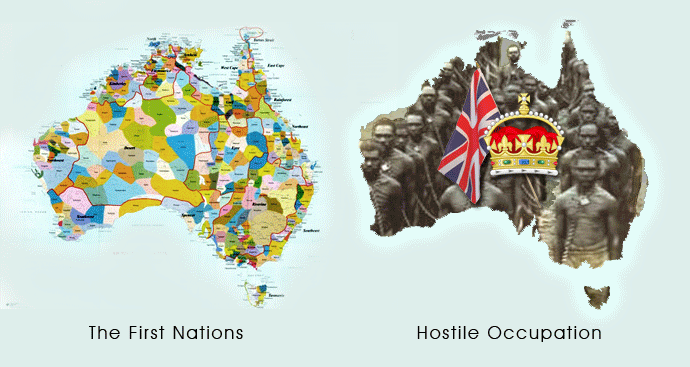
The slogans 'We have survived', 'Always was and always will be Aboriginal Land', 'Sovereignty Never Ceded' and 'Pay the Rent' are no longer just slogans and chants in demonstrations.
The High Court made a most serious admission against interest at paragraph 43 of Mabo (No. 2) when the judges ruled:
43. … However, recognition by our common law of the rights and interests in land of the indigenous inhabitants of a settled colony would be precluded if the recognition were to fracture a skeletal principle of our legal system.
At paragraph 29 of Mabo (No.2) the High Court judges made it very clear that they were prepared to go against their international legal obligations in order to maintain the illegal colonial power, the 'skeletal framework'.
29. … In discharging its duty to declare the common law of Australia, this Court is not free to adopt rules that accord with contemporary notions of justice and human rights if their adoption would fracture the skeleton of principle which gives the body of our law its shape and internal consistency.
In other words, the full bench of the High Court has admitted that, in order to secure their position in decision-making and to maintain the power of the colonial State and federated colonies of the Commonwealth and to maintain their ability to continue to make laws as occupiers, they willingly discriminate and ignore our fundamental freedoms as sovereign independent Nations. The High Court in Mabo admits to being prepared to discriminate against us as First Nations, in order to secure their power whilst being in breach of international law.
This affirms that 'Australia is not a nation formed under the customary international law. The Aboriginal Nations, however, were formed properly under that ancient system. Australia is an administratively formed country by the United Nations, designed to give Britain more votes in the General Assembly. In the light of Australia's non-conformance with UN Human Rights Treaties and Conventions, it is reasonable to hold that this administrative creation of the Nation of Australia is a failure, and Australia is a true failed state.' Read more at:
![]() Australia doesn't deserve a seat on United Nations
Australia doesn't deserve a seat on United Nations
![]() No Independence Day to celebrate! Australia hasn't decolonised from Britain - yet
No Independence Day to celebrate! Australia hasn't decolonised from Britain - yet
![]() First Nations sovereignty movement asks UN to deny Australia a seat on the Security Council
First Nations sovereignty movement asks UN to deny Australia a seat on the Security Council
For all our non-Aboriginal and First Nations sceptics, the conflict of superior laws is indeed a very real issue, because, as Mabo pointed out, if the country was not truly terra nullius there were only two other ways in which the colonisers could acquire our lands legitimately: by conquest or cession, neither of which happened. Any other way is a true invasion.
The rules of the conflict of laws provide that foreign statutes have no effect in overseas jurisdictions. There can be no British Charter 'accepting' English law in Australia. An ancient Law has operated in Australia, and still operates, and has stood the test of time, for millennia, from long before the existence of the British people who colonised our Sovereign Nations.
Contact Ghillar

